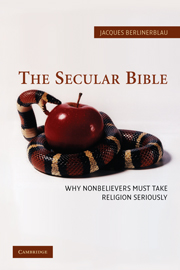Book contents
- Frontmatter
- Contents
- Preface and Acknowledgments
- Introduction: Secularists and the Not Godless World
- PART ONE THE COMPOSITION OF THE HEBREW BIBLE
- PART TWO THE INTERPRETERS OF THE HEBREW BIBLE
- 4 Why Is There So Much Biblical Interpretation?
- 5 Introducing Biblical Scholars and Secular Hermeneutics
- PART THREE POLITICS AND SCRIPTURE
- Conclusion: Beyond Church and State: New Directions for Secularism
- Notes
- Index of Biblical Citations
- Index of Qur'ānic Citations
- Index of Rabbinic, Early Jewish, and Patristic Citations
- Index
4 - Why Is There So Much Biblical Interpretation?
Published online by Cambridge University Press: 05 June 2012
- Frontmatter
- Contents
- Preface and Acknowledgments
- Introduction: Secularists and the Not Godless World
- PART ONE THE COMPOSITION OF THE HEBREW BIBLE
- PART TWO THE INTERPRETERS OF THE HEBREW BIBLE
- 4 Why Is There So Much Biblical Interpretation?
- 5 Introducing Biblical Scholars and Secular Hermeneutics
- PART THREE POLITICS AND SCRIPTURE
- Conclusion: Beyond Church and State: New Directions for Secularism
- Notes
- Index of Biblical Citations
- Index of Qur'ānic Citations
- Index of Rabbinic, Early Jewish, and Patristic Citations
- Index
Summary
Almost the whole of scripture is expressed in enigmas.
Clement, StromataAnd I said, Wait, wait, I know this. This is the Song of Solomon.”
“Or as we call it in our tradition, the Song of Songs.”
“And it's about Christ making love to his Church,” I said.
“It is not about Christ and his Church,” the rabbi declared.
I was taken aback. “Well, I used to do Bible study, and that's what it said in the Bible.”
“Not in our Bible,” the rabbi said. He spoke very absolutely.
“You mean like that's not your interpretation?”
Allegra Goodman, Paradise ParkIn all likelihood, and for better or for worse, the Hebrew Bible/Old Testament is the most interpreted text in the history of the species. Countless generations of Jewish and Christian thinkers have exegeted every single word of scripture, probably no less than a few hundred times each. What is it about this ancient anthology, as opposed to The Epic of Gilgamesh, the Egyptian Book of the Dead, or the Hittite myth The Wrath of Telipinu, that has triggered more than 2,000 years of incessant, frenzied hermeneutic activity? Why are there — as we speak — tens of thousands of seminarians, Yeshiva bokhurs, college professors, and so on, who are devoting their lives to cracking scriptural enigmas? And in light of all the difficulties that it presents, why have so few thrown down their Bibles, thrown up their hands, exclaimed “I can't make any sense of this!”, and bid adieu to Scripture?
- Type
- Chapter
- Information
- The Secular BibleWhy Nonbelievers Must Take Religion Seriously, pp. 57 - 69Publisher: Cambridge University PressPrint publication year: 2005



